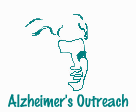 Research
Research
If
you would like to print it out in plain text, click HERE
Understanding Stages and Symptoms of Alzheimer's Disease
Alzheimer's disease develops slowly and causes changes in the brain long before there are obvious changes in a person's memory, thinking, use of words or behavior. Stages and changes the person will go through are outlined below.
Common Changes in Mild AD
- Loses spark or zest for life - does not start anything.
- Loses recent memory without a change in appearance or casual conversation.
- Loses judgment about money.
- Has difficulty with new learning and making new memories.
- Has trouble finding words - may substitute or make up words that sound like or mean something like the forgotten word.
- May stop talking to avoid making mistakes.
- Has shorter attention span and less motivation to stay with an activity.
- Easily loses way going to familiar places.
- Resists change or new things.
- Has trouble organizing and thinking logically.
- Asks repetitive questions.
- Withdraws, loses interest, is irritable, not as sensitive to others' feelings, uncharacteristically angry when frustrated or tired.
- Won't make decisions. For example, when asked what she wants to eat, says "I'll have what she is having."
- Takes longer to do routine chores and becomes upset if rushed or if something unexpected happens.
- Forgets to pay, pays too much, or forgets how to pay - may hand the checkout person a wallet instead of the correct amount of money.
- Forgets to eat, eats only one kind of food, or eats constantly.
- Loses or misplaces things by hiding them in odd places or forgets where things go, such as putting clothes in the dishwasher.
- Constantly checks, searches or hoards things of no value.
Common Changes in Moderate AD
- Changes in behavior, concern for appearance, hygiene, and sleep become more noticeable.
- Mixes up identity of people, such as thinking a son is a brother or that a wife is a stranger.
- Poor judgment creates safety issues when left alone - may wander and risk exposure, poisoning, falls, self-neglect or exploitation.
- Has trouble recognizing familiar people and own objects; may take things that belong to others.
- Continuously repeats stories, favorite words, statements, or motions like tearing tissues.
- Has restless, repetitive movements in late afternoon or evening, such as pacing, trying doorknobs, fingering draperies.
- Cannot organize thoughts or follow logical explanations.
- Has trouble following written notes or completing tasks.
- Makes up stories to fill in gaps in memory. For example might say, "Mama will come for me when she gets off work."
- May be able to read but cannot formulate the correct response to a written request.
- May accuse, threaten, curse, fidget or behave inappropriately, such as kicking, hitting, biting, screaming or grabbing.
- May become sloppy or forget manners.
- May see, hear, smell, or taste things that are not there.
- May accuse spouse of an affair or family members of stealing.
- Naps frequently or awakens at night believing it is time to go to work.
- Has more difficulty positioning the body to use the toilet or sit in a chair.
- May think mirror image is following him or television story is happening to her.
- Needs help finding the toilet, using the shower, remembering to drink, and dressing for the weather or occasion.
- Exhibits inappropriate sexual behavior, such as mistaking another individual for a spouse.
- Forgets what is private behavior, and may disrobe or masturbate in public.
Common Changes in Severe AD
- Doesn't recognize self or close family.
- Speaks in gibberish, is mute, or is difficult to understand.
- May refuse to eat, chokes, or forgets to swallow.
- May repetitively cry out, pat or touch everything.
- Loses control of bowel and bladder.
- Loses weight and skin becomes thin and tears easily.
- May look uncomfortable or cry out when transferred or touched.
- Forgets how to walk or is too unsteady or weak to stand alone.
- May have seizures, frequent infections, falls.
- May groan, scream or mumble loudly.
- Sleeps more.
Needs total assistance for all activities of daily living.
*Adapted from Caring for People with Alzheimer's Disease: A Manual for Facility Staff (2nd edition), by Lisa P. Gwyther, 2001. Published by the American Health Care Association (1201 L Street, NW, Washington, DC 20005)

Hope
our logo helps you find your way back to us.
 Back
Back
 Research
Research Research
Research